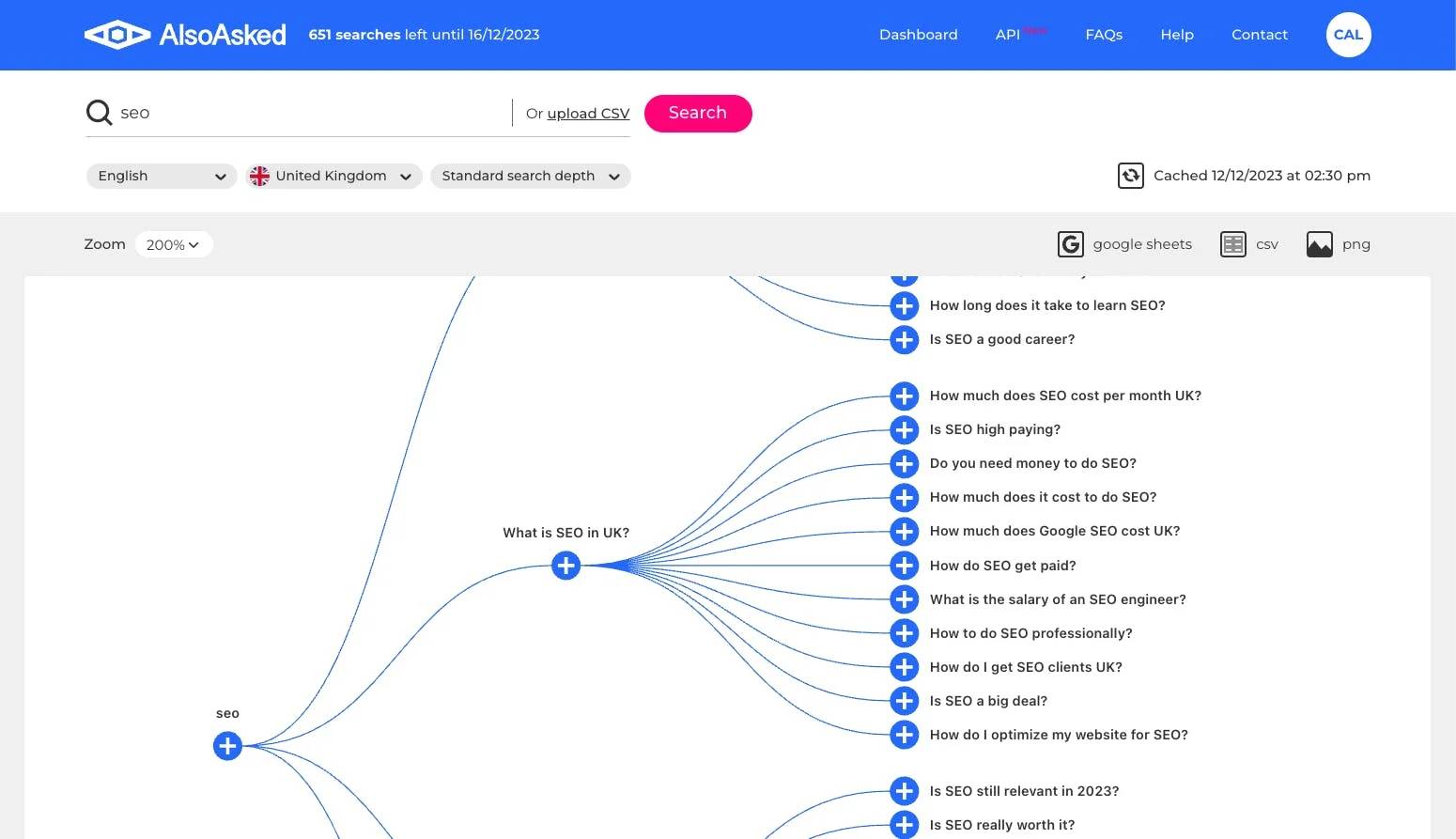|
SEO updates you need to know
🤝 |
|
Semrush acquires Third Door Media. The latest Semrush acquisition includes the publications Search Engine Land and MarTech as well as the conferences Digital Marketing Depot and Search Marketing Expo (SMX). |
✈️ |
|
Google Flights has launched a 'Cheapest' tab. This new feature can save you money on your flights but may make the times and transfers more difficult in the process. Will we see more 'Cheapest' features in other Google products? |
🚢 |
|
Bing has 27 unshipped features. Bing CEO Mustafa Suleman says that Bing is "brave enough to undo complexity". This appears to be in response to the overall feeling of many users that search engines are overly complex today. |
Our sponsor: AlsoAsked

Understanding users beyond 'keywords' with live data and intent clustering by Google
AlsoAsked allows you to quickly mine live "People Also Ask" data, the freshest source of consumer intent data, for understanding what users are searching about beyond 'keywords' and what you should be writing about.
Get 90 searches per month with no account creation, for free.
|
Search with Candour podcast

New local SEO strategies you should be doing
Season 3: Episode 4
Join host Jack Chambers-Ward and special guest Darren Shaw, founder of Whitespark, as they dive into the latest in local SEO and Google Business Profile optimisation.
Discover key updates expected in 2025, innovative methods to enhance rankings, the impact of custom service entries, strategic use of Google Posts, and the importance of robust Q&A sections.
From optimising menu items for restaurants to leveraging photos and videos effectively, this episode is packed with expert insights and practical tips essential for SEO professionals and business owners.
|
|
|
This week's solicited SEO tips:
What is link velocity?
You've probably seen people posting about "link velocity" as some kind of secret to ranking, so let's talk through some facts and thoughts!
❔ Generally when people talk about "link velocity", they are simply referring to the rate at which your website is gaining new backlinks.
❎ There is a misconception that there is an "optimal" link velocity, or that your link velocity should be within some parameters based on your competitors.
👀 Combined with other signals, link velocity can give Google some hints that you may be doing something either shady or good.
🧠 Let's consider two scenarios: 100 links in a single month to site A could be a spam signal. 100 links in a single month to an almost identical site B could be a signal that it's doing amazing things - but what is the difference?
📊 The popularity (let's say PageRank) of the linking sites contributes to what an optimal/acceptable link velocity is, let's think about those two previous examples:
1) Website A 100 links from small blogs, all of which Google can approximate have very low traffic. This doesn't make a lot of sense, how would all of these tiny websites find out about your site within such a short timeframe? It smells like manipulation!
2) Website B gets 99 links from small blogs and 1 link from The Guardian. That makes perfect sense: when you land top-tier coverage or get mentioned and linked on popular websites, a large cohort of people instantly learn about your site. A natural consequence of this is that you're then picked up a collection of smaller (sometimes spammy websites).
Google has one of the largest snapshots of the web, how it links together and how it changes, so it has the data to do this kind of analysis.
The truth is, it's a lot more complicated than simply saying "you need X links per month". Quality > quantity, every time! 📈
|

Google is always course correcting towards its destination
It's sometimes worth thinking of Google's algorithm as a ship sailing towards a destination. The destination is Google's 'strategic ideal' of the SERPs they want. It's a bit of a moving target, so sometimes Google needs to course adjust - and it does this with algorithm updates ⚓
Some of these 'course corrections' cause the ship to rock and things on deck become a bit choppy. During these times, there is usually something "exploitable" about the algorithm. Something you can lean into to make your site rank a bit unfairly. ☠
The problem is, when everyone runs to one side of the ship, it will eventually right itself and those on the very edge tend to fall overboard.
tl;dr Yes, there are imperfections in Google's algorithm you can use to your advantage. If you exploit them too heavily, you'll likely end up in a worse (and wetter) position than you started. Long game.
Image: SKALD: Against The Black Priory ⚔
|
DA, DR and TF are not ranking factor
Domain Authority (DA), Domain Rating (DR), TrustFlow (TF), none of these things help you rank, none are used by Google, they are all metrics invented by third-party tools. 👨🔬
✅ These metrics can be useful in the absence of other data, as they will usually give a good indication about which domain is more popular or in better standing.
❎ I would absolutely not be using these domains as a ‘success metric’, measuring their change or setting targets based on them.
☠ It is worth noting most of them can be faked fairly easily, so exercise caution if you’re buying a domain that looks too good to be true.
|
Don't use robots.txt to block CSS, images or theme files
It's a common mistake to use robots.txt to block access to CSS, images or theme files of your site. 😣
Google is trying to render your site as users see it, so it helps if you let Google access these, to make an accurate render and better understand the content.
|

You should probably ignore keyword difficulty
Keyword Difficulty (KD) is a proprietary metric that is calculated differently by many different tool vendors, so be very careful if you are going to make any decisions based on this metric!
Here is a fantastic example that Chris Ridley shared with me where Semrush and Ahrefs rated the same keyword as "Very Hard" and "Very Easy". ⬇
Personally, I completely ignore KD metrics when making SEO plans. 💅
|
Refer subscribers and earn rewards!
Top Core Updates referrer leaderboard
A big thank you to our top referrers, who have signed up over 10 people to the Core Updates newsletter, go follow them!
🥇 MJ Cachón Yáñez (LinkedIn / X)
🥈 Nikki Pilkington (LinkedIn / X)
🥉 Lidia Infante (LinkedIn / X)
|
We'd love to hear from you
If you've got any thoughts about what you like, what you dislike, or what you think we should add/change to the newsletter, then hit reply!
We really do read every bit of feedback!
~ Mark and Jack
|
|
|
|